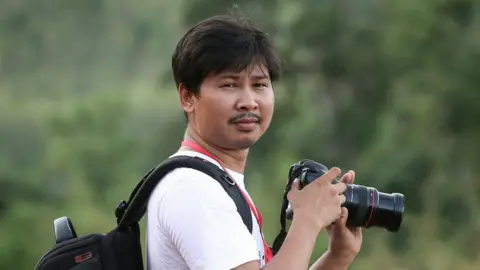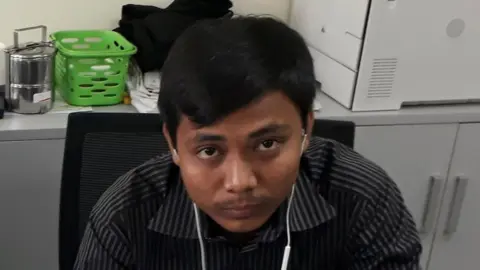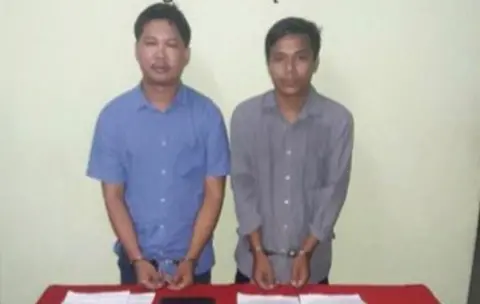Myanmar's 'drastic' arrest of journalists causes concern
 Reuters
ReutersLong before the crisis in Rakhine state hit the world's headlines, some of the best, ground-breaking reporting was being done by the Yangon bureau of the Reuters news agency.
And the name which most often appeared on the byline of these stories was Wa Lone.
A young man from a small village near Mandalay, he made his name as a journalist working for The Myanmar Times in the build-up to the historic 2015 election which brought Aung San Suu Kyi's National League for Democracy to power. He then joined Reuters in July 2016.
The details in Wa Lone's reports of the military operations against Rohingya in Rakhine have given a vivid picture of the conflict, in a state where journalists and independent investigators are given almost no access.
Since September this year, Wa Lone was joined at Reuters by Kyaw Soe Oo, an ethnic Rakhine writer and therefore a valuable asset in covering a state where the local population is often hostile to journalists.
The lack of access to Rakhine state forces journalists to seek other sources of information about what is happening there.
 Reuters
ReutersOn the evening of 12 December the two Reuters reporters had gone to a meeting with two police officers at a northern Yangon restaurant, where they were detained.
A photograph posted on the Ministry of Interior's Facebook page the next day showed both reporters, in handcuffs, standing next to some documents, with a statement that they would be charged under the colonial-era Official Secrets Act for "illegally acquired information with the intention to share it with foreign media".
The charge carries a prison sentence of up to 14 years.
 Myanmar Government
Myanmar GovernmentSince then neither Reuters, the two men's families, nor their lawyers have had any contact with them, prompting protests from the US and the EU. The group Human Rights Watch has described their detention as an enforced disappearance.
A spokesman for Ms Suu Kyi has said the two men will be afforded the protection of the law, and will soon be brought to trial.
Questions over drastic move
So the two police officers, who are reportedly also being charged, apparently gave documents to the two reporters. What was in those documents that prompted this drastic move by the Myanmar authorities?
As the officers had until recently worked in Rakhine state, it can be guessed that the documents contained information about the actions and operational orders of the security forces, which have been accused by human rights groups of abuses of Rohingya civilians that could amount to crimes against humanity.
Until now, the only accounts of the behaviour of the Myanmar security forces have been from the refugees who fled to Bangladesh.
The sole investigation allowed inside Rakhine state was carried out by the Myanmar military, which, unsurprisingly, has exonerated itself of all wrongdoing, without addressing the detailed allegations made by human rights groups.
Intriguingly another theory has been put forward, linking the two Reuters journalists to the announcement this week by the military that it was investigating a mass grave found in a village called Inn Din.
This was unexpected. The only mass grave publicised by the authorities before this was one in September, supposedly containing the bodies of dozens of Hindus, who the government says were killed by Rohingya militants. No independent investigation was allowed.
But Inn Din was a mixed community, where the human rights group Amnesty International has already documented an attack on the Rohingya by security forces in late August, and then the burning of their homes.
That suggests any victims in the grave are likely to be Rohingya - but would the authorities admit this, something they have refused to do up to now?
A local newspaper has now reported that three days after the Reuters reporters were arrested, five ethnic Rakhine residents of Inn Din were detained on suspicion of giving information about what happened in their village to journalists.
Some residents believe Wa Lone and Kyaw Soe Oo were among those journalists, although this cannot be confirmed. Two of the detained residents have since been released.
So could the reporters' arrests be linked to that mass grave in Inn Din, and the allegations of a massacre there by the Myanmar security forces?
Given the detailed testimony already published about atrocities in other parts of Rakhine state, it is difficult to understand why this one would be more sensitive.
But if local Rakhine people had been talking to journalists about it, rather than Rohingya refugees in Bangladesh, it would make the military's insistence that its troops did nothing wrong even harder to sustain.
Or, the arrests of Wa Lone and Kyaw Soe Oo might instead be linked to their other investigations of events in Rakhine state, which have shone a brighter light than pretty much any other reporting into the actions of the security forces.
The Myanmar government and armed forces have already demonstrated that they are more than ready to use the country's archaic and repressive laws against journalists who cross them.
Since the restoration of semi-civilian rule in 2012, at least a dozen journalists have been prosecuted under laws like criminal defamation and the Unlawful Association Act, although in September the military agreed to drop charges against six of them.
The US-based Committee to Protect Journalists has included Myanmar in its list of the ten most censored countries in the world.
